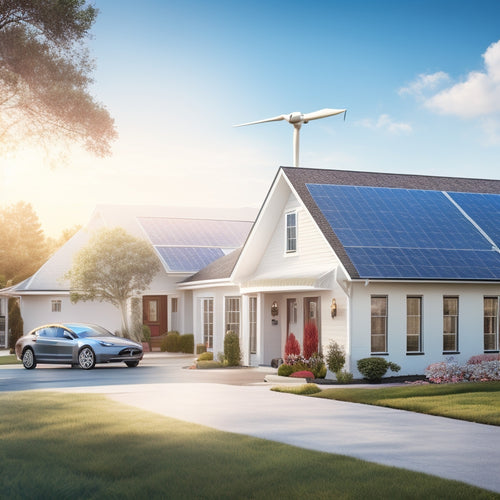
Do You Need Solar Energy to Reduce Your Carbon Footprint
Share
You generate a staggering 16,000 pounds of carbon dioxide per year, contributing to the 36 billion tons released annually due to human activities. To reduce your carbon footprint, consider solar energy, which minimizes environmental impact by employing renewable resources and reducing reliance on fossil fuels. While the initial investment may seem high, solar energy provides long-term savings, energy independence, and government incentives to offset installation costs. By evaluating your energy consumption patterns, roof size, and local building codes, you can determine if solar energy is suitable for you. Now, take the next step to understand how solar energy can help you make a positive impact on the environment.
Key Takeaways
- Evaluating your energy consumption patterns and roof size/orientation helps determine if solar energy is suitable for reducing your carbon footprint.
- Solar energy systems reduce reliance on fossil fuels, minimizing environmental impact and contributing to a lower carbon footprint.
- Conducting an energy audit helps identify areas of energy waste, allowing you to make informed decisions about solar energy implementation.
- Government incentives and tax credits can substantially reduce the initial investment costs of solar energy systems, making them more accessible.
- Assessing local building codes and installation options (rooftop, ground-mounted, tracking systems) is crucial for a successful solar energy project.
Understanding Your Carbon Footprint
Every day, approximately 36 billion tons of carbon dioxide are released into the atmosphere, primarily due to human activities such as burning fossil fuels, deforestation, and industrial agriculture.
As an individual, you contribute to these emissions through your daily activities, from driving to work to using energy-intensive appliances at home. Your carbon footprint is the sum of these emissions, and it has a significant ecological impact on the environment.
You're likely aware of the negative effects of carbon emissions on the planet, including climate change, air pollution, and habitat destruction.
However, you may not realize the extent of your personal contribution to these problems. By understanding your carbon footprint, you can identify areas where you can make changes to reduce your impact.
This might involve switching to energy-efficient light bulbs, using public transportation, or reducing your meat consumption.
Benefits of Solar Energy Systems
Your shift to renewable energy sources can greatly reduce your carbon footprint, and solar energy systems offer numerous benefits in this pursuit. By capturing the power of the sun, you'll markedly decrease your reliance on fossil fuels, minimizing your environmental impact.
Solar energy systems employ renewable resources, ensuring a sustainable future for generations to come. With energy independence, you'll be less affected by fluctuating energy prices, providing a sense of security and control over your energy consumption.
Investing in solar energy is a long-term investment, as the technology continues to advance, increasing efficiency and reducing maintenance costs. In addition, government incentives, such as tax credits, can help offset the initial investment.
As technological advancements continue to improve, the efficiency and affordability of solar energy systems will only increase, making it an attractive option for those looking to reduce their carbon footprint.
Costs and Savings Analysis
The initial investment in a solar energy system can seem intimidating, but a thorough costs and savings analysis reveals a more detailed depiction.
You may be surprised to find that the benefits of solar energy extend beyond environmental advantages to also include financial perks.
When considering the installation expenses of a solar energy system, it's crucial to weigh them against the long-term savings.
Here are three key factors to keep in mind:
-
Reduced Energy Bills: Solar energy systems generate free energy, considerably decreasing your reliance on traditional power sources and resulting in lower energy bills.
-
Government Incentives: Many governments offer tax credits, rebates, or other incentives to homeowners and businesses that invest in solar energy, offsetting a substantial portion of the installation expenses.
-
Increased Property Value: Installing a solar energy system can increase your property value, making your home or business more attractive to potential buyers if you decide to sell in the future.
Is Solar Energy for You
As you weigh the pros and cons of solar energy, it's essential to reflect on whether this renewable energy source aligns with your specific needs and circumstances.
You need to take into account your energy consumption patterns, the size and orientation of your roof, and local building codes. For instance, if you live in an area with frequent shading or have a small roof, solar energy mightn't be the best fit. On the other hand, if you have a large, south-facing roof and high energy bills, solar energy could be an excellent option.
You should also investigate the different solar panel types, such as monocrystalline, polycrystalline, and thin-film panels, to determine which one suits your needs.
Additionally, think about the installation options, including rooftop, ground-mounted, and tracking systems. By evaluating these factors, you can determine whether solar energy is a viable solution for reducing your carbon footprint and meeting your energy needs.
Taking the First Step
Now that you've determined solar energy is a viable solution for your energy needs, it's time to take action. Taking the first step towards reducing your carbon footprint with solar energy requires careful planning and consideration.
When considering solar energy, there are several initial considerations to keep in mind. These include:
-
Energy Audit: Conducting an energy audit will help you understand your energy consumption patterns, identifying areas where you can reduce energy waste and optimize your energy usage.
-
Assessing Your Roof: Evaluate your roof's size, orientation, and condition to determine if it's suitable for solar panel installation.
-
Local Incentives: Research local incentives, tax credits, and policies that may impact the cost and feasibility of your solar energy project.
Frequently Asked Questions
Can I Install Solar Panels on a Rented Property?
You'll need to review your rental agreements and obtain landlord permission before installing solar panels on a rented property, as modifications typically require their consent, ensuring a harmonious and mutually beneficial arrangement.
Do Solar Panels Work During Power Outages?
You'll be glad to know that solar panels can't provide power during outages unless you have a battery storage system, which allows you to store excess energy for later use, offering a reliable power outage solution.
Are Solar Panels Affected by Extreme Weather Conditions?
You're wondering if solar panels can withstand extreme weather conditions? Fortunately, modern solar panels are designed to be highly durable and resistant to extreme weather impact, ensuring peak performance even in harsh environments.
Can I Sell Excess Energy Generated by My Solar Panels?
You're not alone in generating excess energy - 85% of solar panel owners do! With net metering benefits, you can sell excess energy back to the grid through energy buyback programs, offsetting your utility bills and maximizing your solar investment.
Do Solar Panels Require Regular Maintenance?
You'll be pleased to know that solar panels require minimal maintenance, ensuring a long solar panel lifespan. Regular cleaning and inspections will keep them running efficiently, with maintenance costs being relatively low, around $300 to $1,500 per year, depending on the system size.
Conclusion
As you gaze up at the sky, imagine the sun's rays capturing power for your home, reducing your reliance on fossil fuels and shrinking your carbon footprint. With solar energy, you can breathe easier, knowing you're contributing to a cleaner environment. The benefits are clear: lower energy bills, increased property value, and a smaller impact on the planet. Take the first step towards a sustainable future, and let the sun shine brightly on your path to a greener tomorrow.
Related Posts
-

Why You Need a Phone Mount for Navigation
When you're on the road, a reliable phone mount is not just a convenience, it's a safety necessity that helps you mai...
-

5 Essential Tips for Buying EV Charging Systems Online
When purchasing an EV charging system online, you'll want to make sure you're making an informed decision. First, det...
-

Why Homeowners Are Embracing DIY Energy Independence
By taking control of your energy needs, you're breaking free from the uncertainty of utility bills and embracing a se...


